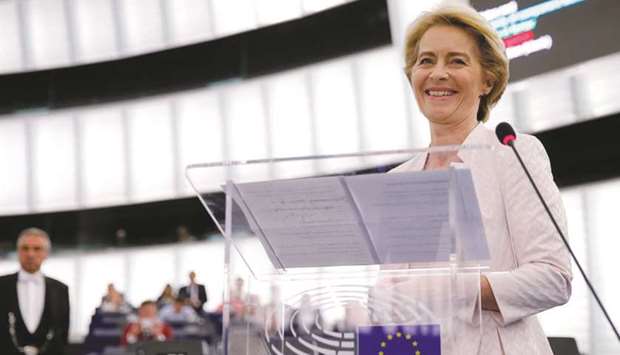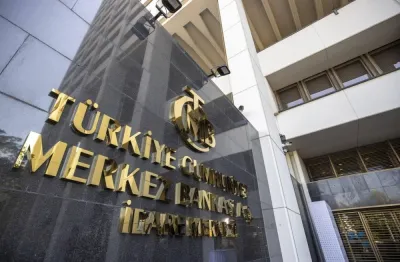Ursula von der Leyen had to dangle a range of promises on migration, taxes, climate change and the rule of law to secure even a wafer-thin margin of support in the European Parliament to become the EU’s first female chief executive.
But delivering on those pledges will be an even harder task for Von der Leyen, a close ally of German Chancellor Angela Merkel, because the EU’s national leaders, although they picked her for the job, are deeply at odds over many of those issues.
The 28 member-states are divided on how to handle refugees, on committing to carbon neutrality by 2050 and on the question of safeguarding democracy in the bloc.
“She promised a whole lot of things and it’s not clear at all that we would be able to deliver,” said one senior EU diplomat. “It’s good to have ambition but one can already see that some areas will be extremely difficult.”
Policy gridlock would inflict further damage on the EU, which has been buffeted in recent years by the euro zone debt crisis, Britain’s decision to leave, an erosion of democratic norms and the rise of far-right and far-left eurosceptic parties.
As head of the EU executive Commission for five years from November, Von der Leyen will oversee trade negotiations, economic and climate policy for 500mn Europeans and antitrust rulings involving powerful tech giants.
She was approved in a secret ballot of EU lawmakers on Tuesday, but with only nine more votes than the 374 required in the badly fractured assembly.
Some lawmakers from Von der Leyen’s own centre-right party appear to have deserted her at the last minute, perhaps piqued by her promises of a greener and more equitable Europe that were designed to win over wavering socialists and liberals.
Making up for the lack of centrist votes, Von der Leyen has non-mainstream parties — including Poland’s ruling nationalist Law and Justice (PiS) party — to thank for getting her across the line in parliament.
The competing demands that parties make on the new European Commission president as the price for their support in Tuesday’s vote will be writ large in the European Council of national leaders, who are just as divided as the parliament.
Already decisions on the most contentious issues tend to stall in the council because many of the EU’s key policy decisions require unanimity among the national capitals.
Poland and Hungary have led an eastern states’ revolt against the ambitious 2050 climate goal, striking it down last month.
Von der Leyen has proposed a transition fund whereby wealthier states would support their poorer peers in phasing out coal and helping with job losses, but it remains to be seen if this will be enough to win them over.
Raising the EU’s climate ambitions does resonate with many capitals, especially Paris.
France will also be happy with her economic and social policy proposals, which include continuing work towards a euro zone budget and a scheme to safeguard bank deposits in euro zone countries.
Both plans have been held up, mostly due to opposition from Von der Leyen’s native Germany.
Von der Leyen also proposed an EU-wide unemployment scheme and a minimum wage.
“As with many other things she has promised, the social pillar is a very sensitive issue,” said another EU diplomat.
“The economic situation and social structure differs a lot among member states, which is precisely why work on harmonising that has been difficult. It’s hard to see anything quick.”
On taxation, the EU’s work on a digital tax, a common corporate tax and ensuring big tech companies pay in Europe — all among Von der Leyen’s promises — have also stalled over opposition from Ireland, the Netherlands and others.
To allow progress, Von der Leyen wants to switch to majority — rather than unanimous — approval for tax, foreign policy, climate, energy and social issues.
“The paradox is that EU states would need to agree unanimously to move to majority decisions. None would voluntarily sign up for the risk of being outvoted on an important file,” a third EU diplomat said.
Von der Leyen’s idea to give the European Parliament the right to propose legislation — currently it can only vote on laws put forward by the Commission or EU states — would require changing the bloc’s founding treaties, with the risk of ratification being compromised by resurgent eurosceptic groups.
She did not explain how she would “relaunch” talks on the EU’s broken asylum rules, discussion of which has caused splits between southern states where migrants arrive, rich destination countries and easterners which refuse to help host new arrivals.
If she acts on her promises to be tougher than the outgoing Commission on ensuring all EU states honour democratic standards, she would anger Hungary and Poland,
Beata Mazurek, spokeswoman of Poland’s ruling PiS party, told Reuters on Wednesday that Warsaw wants the new Commission to treat all EU states equally.
Poland has complained repeatedly that the current Commission’s legal action against Warsaw over the rule of law is biased.

Elected European Commission President Ursula von der Leyen delivers a speech after a vote on her election at the European Parliament in Strasbourg, France.


